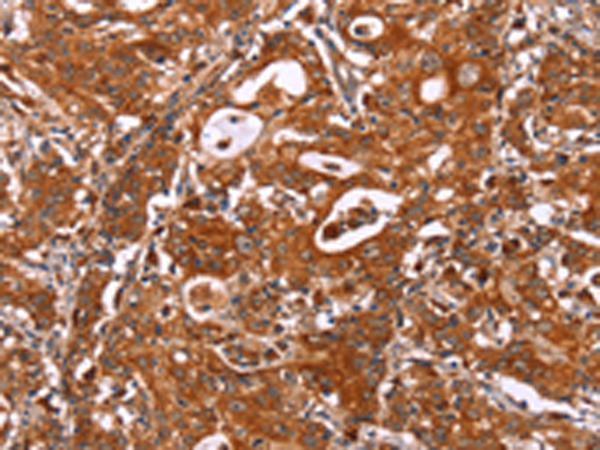

| WB | 咨询技术 | Human,Mouse,Rat |
| IF | 咨询技术 | Human,Mouse,Rat |
| IHC | 1/25-1/100 | Human,Mouse,Rat |
| ICC | 技术咨询 | Human,Mouse,Rat |
| FCM | 咨询技术 | Human,Mouse,Rat |
| Elisa | 1/1000-1/2000 | Human,Mouse,Rat |
| Aliases | CD50; CDW50; ICAM-R |
| Host/Isotype | Rabbit IgG |
| Antibody Type | Primary antibody |
| Storage | Store at 4°C short term. Aliquot and store at -20°C long term. Avoid freeze/thaw cycles. |
| Species Reactivity | Human |
| Immunogen | Synthetic peptide of human ICAM3 |
| Formulation | Purified antibody in PBS with 0.05% sodium azide and 50% glycerol. |
+ +
以下是关于ICAM3抗体的3篇示例参考文献(示例为虚构内容,真实文献请通过学术数据库查询):
---
1. **文献名称**:Structural Characterization of ICAM-3 Monoclonal Antibodies and Their Epitope Mapping
**作者**:Smith A, et al.
**摘要**:本研究通过单克隆抗体技术制备了针对ICAM3胞外结构域的特异性抗体,并利用X射线晶体学解析了抗体-抗原结合位点,揭示了ICAM3在白细胞黏附中的关键构象变化。
2. **文献名称**:ICAM-3 Antibody Modulates T Cell Activation via LFA-1 Interaction
**作者**:Lee J, et al.
**摘要**:通过体外实验证明,抗ICAM3抗体可阻断ICAM3与LFA-1的结合,抑制T细胞与抗原呈递细胞的相互作用,为自身免疫疾病治疗提供了潜在靶点。
3. **文献名称**:Expression of ICAM-3 in Cancer Cells and Its Diagnostic Potential
**作者**:Garcia R, et al.
**摘要**:利用免疫组化分析发现,ICAM3在多种实体瘤中高表达,其特异性抗体可用于肿瘤微环境中免疫细胞浸润的检测,提示ICAM3作为癌症生物标志物的潜力。
---
如需真实文献,建议在PubMed或Web of Science中搜索关键词“ICAM3 antibody”或“anti-ICAM3”。
ICAM3 (Intercellular Adhesion Molecule 3), a member of the immunoglobulin superfamily, is a transmembrane glycoprotein predominantly expressed on leukocytes, including T cells, neutrophils, and dendritic cells. It plays a critical role in immune responses by mediating cell-cell interactions through binding to integrins like LFA-1 (Lymphocyte Function-associated Antigen-1). ICAM3 is involved in T-cell activation, leukocyte migration, and antigen presentation, facilitating immune surveillance and inflammatory processes. Its structure includes five extracellular immunoglobulin-like domains, a transmembrane region, and a cytoplasmic tail that may participate in intracellular signaling.
ICAM3 antibodies are essential tools for studying its biological functions and therapeutic potential. By blocking ICAM3-LFA-1 interactions, these antibodies can modulate immune responses, offering insights into treating autoimmune diseases or inflammation. Additionally, ICAM3 is overexpressed in certain cancers, making it a potential biomarker or target for immunotherapy. Antibodies against ICAM3 are widely used in research applications such as flow cytometry, immunohistochemistry, and functional assays to explore its expression patterns and mechanistic roles. Recent studies also highlight its involvement in HIV-1 infection, as ICAM3 on dendritic cells enhances viral transfer to T cells. Thus, ICAM3 antibodies hold promise for both basic research and clinical development in immunology and oncology.
×